
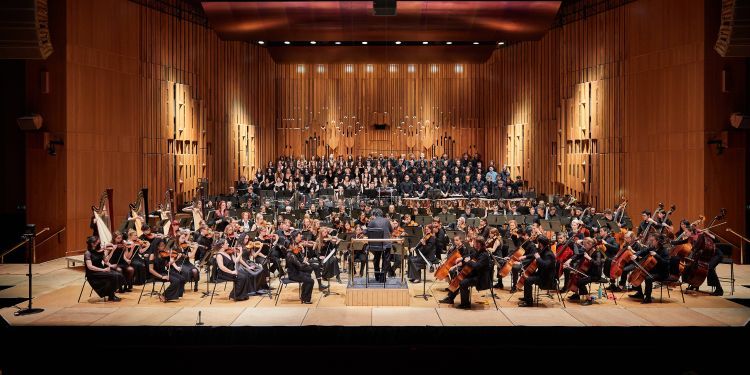
In Conversation with the 2023 Gold Medal finalists
The final of Guildhall School's most prestigious music prize returns to Barbican Hall next week, Wednesday 10 May.
The exciting evening showcases four outstanding Guildhall singers, performing with piano accompaniment in the concert's first half, and with the Guildhall Symphony Orchestra in the second half.
Ahead of the concert, we sat down with this year's finalists to hear more about the pieces they've included in their programmes and how they felt when they found out they'd been chosen to perform in this year's Gold Medal Final.
Our 2023 finalists are Miku Yasukawa (soprano), Michael Lafferty-Smith (baritone), Alexandra Achillea Pouta (mezzo soprano) and Lorna McLean (soprano).
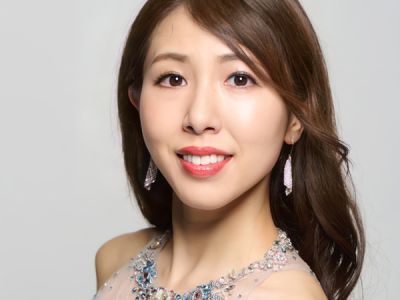
Miku Yasukawa
Could you tell us about the pieces you'll be performing in the Gold Medal final?
Accompanied by pianist Florent Mourier, I'll be performing two lovely Strauss pieces and Debussy, as well as a Japanese acapella piece. For the second half with the orchestra, I’m performing Mozart's Queen of the Night and Nanetta’s Aria by Verdi, along with a piece by Ravel.
How did you feel when you found out you’d been picked as a finalist?
I noticed that my phone was receiving a lot of messages from my friends. Then, I checked and there were a lot of congratulations messages. I was extremely happy!
What are your plans for the future, and after you graduate?
I’m booked for many concerts, both in Japan and the UK. But, I think I’d love to have my base in London and do my best to get more opportunities to perform here in the UK. My dream is to become a singer who performs internationally.
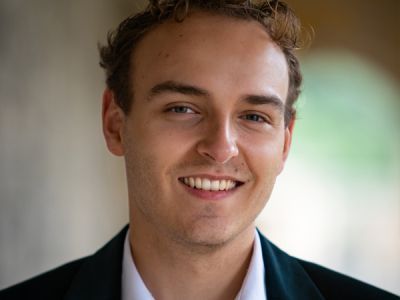
Michael Lafferty-Smith
Could you tell us about the pieces you'll be performing in the Gold Medal final?
In the song section, William Bracken and I will be performing two pieces by Schubert, which are two of my favourite works by this composer. We’ll also be performing a piece by Ravel from Histoires naturelles, called La pintade, which means ‘The guinea fowl’. I’m then performing My Sweet Old Etcetera by my friend Ben Rowarth, who’s a wonderful composer. And then to finish, Barber’s O Boundless, Boundless Evening.
In the orchestral section, I’ll be performing three pieces. The first is Le Directeur's Aria from Poulenc’s opera Les mamelles de Tirésias. Secondly, it’s another piece by Schubert, but orchestrated by Liszt. And to finish, it’s Mein Sehnen, mein Wähnen from Korngold’s Die tote Stadt.
How did you choose your repertoire?
All of the repertoire in the song section are pieces that I’ve sung a lot and have probably been my favourite things to perform over the ten plus years that I’ve been singing at a higher education level. It’s just a collection of really wonderful stories that are very close to my heart.
How did you feel when you found out you’d been picked as a finalist?
I was very excited for sure, but I was also quite nervous. It’s a huge privilege to be able to perform all this repertoire that Will and I have chosen, at the Barbican. It’s a fantastic venue, and I’m really excited to share this wonderful music with an audience.
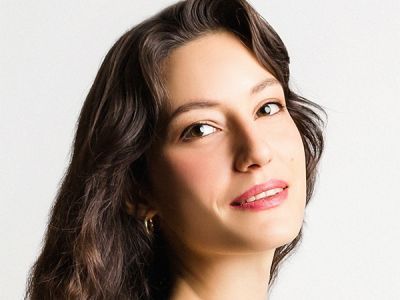
Alexandra Achillea Pouta
Could you tell us about the pieces you'll be performing in the Gold Medal final?
In the piano round, with my accompanist William Bracken, I’ll be performing two works by Messiaen and pieces by Varése, Santoliquido and Ligeti.
In the orchestral round, I’ll share two songs by Ravel from his five Greek songs, and an aria from Bellini’s Capuleti ed i Montecchi. We’ll then be finishing with a song by Szymanowski.
How did you choose your repertoire?
I mostly tried to imagine an atmosphere for the piano round, and I knew I wanted to start and finish with Messiaen. The pieces in between are very contrasting but they all share very dark, yet also some cheerful, elements. They’re also pieces that I’d love to perform, so I just went with my instinct.
Then the orchestral round is very personal in many ways. Singing Ravel’s Greek songs is very touching to me, because this will be my last performance at Guildhall before I graduate, and I’ll be singing songs in Greek. Ravel’s Greek songs are rarely performed in Greek or with an orchestra so it’s going to be quite a special moment. Then Romeo's aria is one of my favourites and it was kind of a given for me to perform this, if I got to the Final. Szymanowski’s Das Grab des Hafis is an incredible work. I don’t even consider it to be for voice and orchestra. It’s just an orchestral piece, and the voice is part of the orchestra. And that’s what I love about this song.
How did you feel when you found out you’d been picked as a finalist?
I was thrilled. Very happy, and scared, but mostly thrilled. Since that day, I’ve been looking forward to it. I’m very happy!
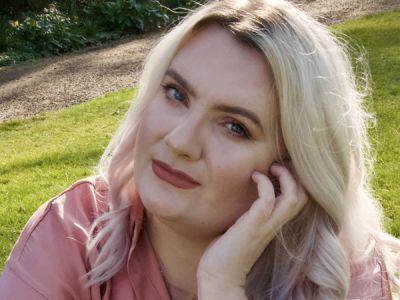
Lorna McLean
Could you tell us about the pieces you'll be performing in the Gold Medal final?
Together with my pianist Aleksandra Myslek, we’re going to be performing some Cilea, Poulenc, along with Griffes, who’s a 20th-century American composer that not many people know about, but I think he’s awesome. And we’ll also be performing some Strauss, who’s my favourite.
How did you choose your repertoire?
I really wanted to perform Puccini’s Signore, ascolta!, as it was the first aria I ever heard when I was 14 years old. I heard it at the Cardiff Singer of the World and I really loved it, so to do a full-circle moment and perform that aria is going to be amazing, I can’t wait.
How did you feel when you found out you’d been picked as a finalist?
When I first got the email, I thought it was a mistake! I thought they were going to send me an email with the correct name on it. Then disbelief set in, because I’ve been here for eight years and have always wanted to do the Gold Medal. I’m really excited and really looking forward to it. It’s going to be such a good finish to my studies.
The Gold Medal Final takes place in Barbican Hall at 7pm on Wednesday 10 May 2023. Tickets available here

